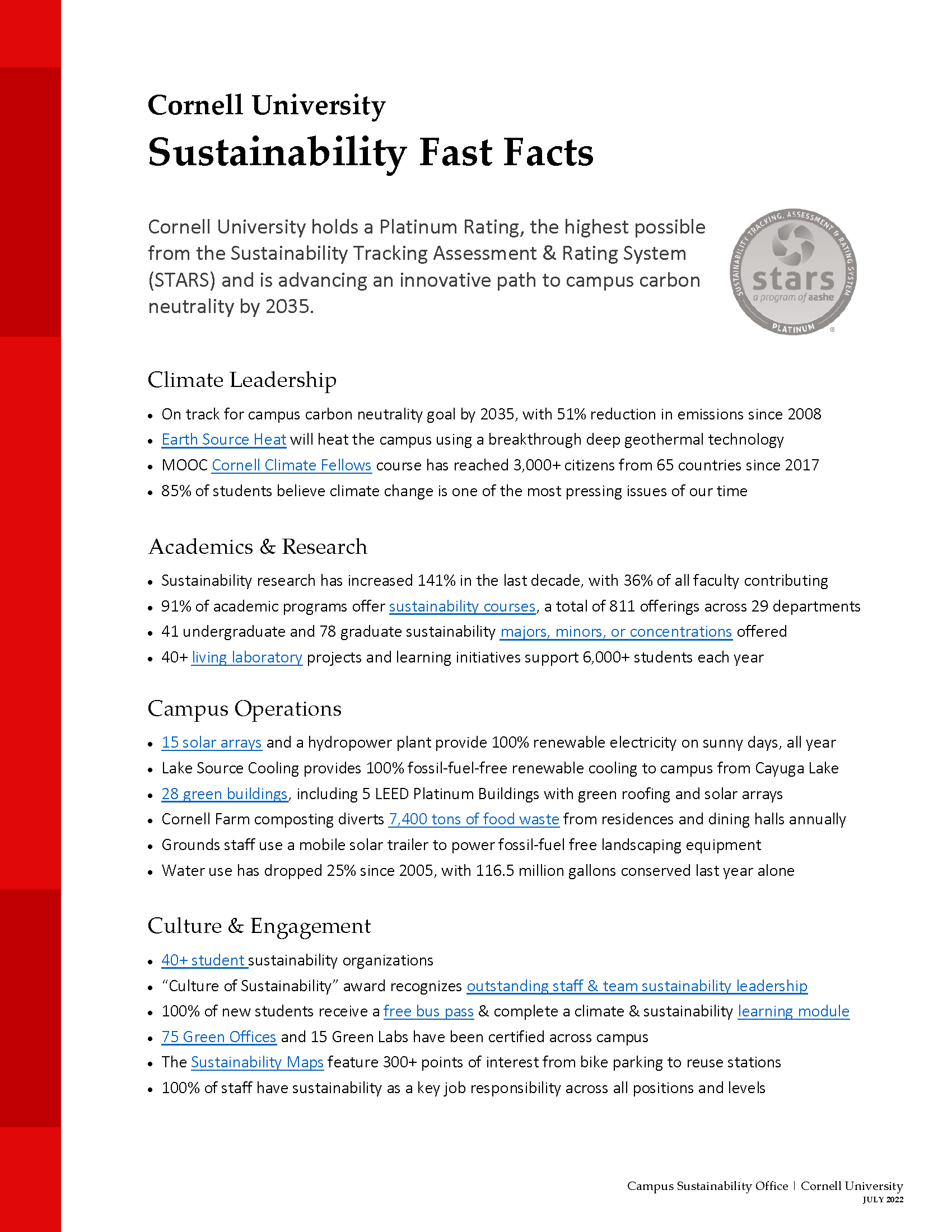Sustainability Fast Facts
Looking for a quick run-down on some of Cornell's sustainability facts and highlights? The Sustainability Fast Facts provide an overview of our University's achievements and key commitments.
Do you have a fact you would like included in the Fast Facts? Send us an email. For more comprehensive facts and figures, browse this website or contact our team or visit these pages:
2022 Snapshot Facts
Last Updated July 2022
Climate Leadership
- Cornell is the Top Ivy institution for sustainability according to the Princeton Review Green Honor Roll, STARS, and the Carbon Commitment
- Cornell holds a Platinum Rating in the Sustainability Tracking, Assessment & Rating System (STARS) — the highest possible — for comprehensive sustainability efforts. Cornell is the first institution to have achieved this rating for three consecutive years
- We are on track to meet our ambitious campus carbon neutrality goal by 2035, with a 51% reduction in emissions since 2008. Cornell has the most successful carbon reduction among Ivy League schools and has the most ambitious neutrality goal
- Earth Source Heat is being explored as an option to heat the campus using a breakthrough deep geothermal technology
- The Civic Ecology Lab hosts a large online course for international Cornell Climate Fellows which has reached 3,000+ citizens from 65 countries since 2017
- 85% of students believe climate change is one of the most pressing issues of our time
Public Engagement
- Winner of the 2018 US EPA Leadership in Green Power Education Award for efforts to advance access, education, and public engagement in renewable energy resources, especially in low-income communities across New York State
- The Cornell Institute for Climate Smart Solutions’ online course has reached 2,500+ citizens from 65 countries since 2017
- Helped launch the New York Higher Ed Large Scale Renewable Energy project in 2018, the largest ever consortium of campus purchasing partners to solicit new renewable energy projects in New York State
- The Cascadilla Community Solar Farm will provide 3,000+ local residents with energy from solar panels on Cornell-owned land
Campus Engagement
- Residential composting was launched in all campus housing in ’18-19, diverting 39 gallons of food waste per week
- Planning for a campus-wide strategic sustainability plan aligned with UN Sustainable Development goals is underway
- 75 Green Offices and 15 Green Labs have been certified across campus
- Winter Energy Setback avoids an average of ~$100,000 in electricity costs each year
- The Campus Sustainability Maps feature 300+ points of interest including the 21 green buildings, bike parking, composting locations & gender-neutral bathrooms
- New student orientation events include sustainability and climate literacy
- 40+ student sustainability organizations
- “Culture of Sustainability” award recognizes outstanding staff & team sustainability leadership
- 100% of staff have sustainability as a key job responsibility across all positions and levels
Campus Operations
- 0% growth in energy use since 2000
- Over a third of the way to carbon neutrality with emissions down 36% since 2008
- 28 green buildings, including 5 LEED Platinum Buildings with green roofing and solar arrays
- 15 solar arrays and a hydropower plant provide 100% renewable electricity on sunny days, all year
- Lake Source Cooling provides 100% fossil-fuel-free renewable cooling to campus from Cayuga Lake
- Total campus waste is down 1/3 in the last five years; reuse & reclamation doubled in the last year
- Cornell Farm composting diverts 4,000 tons of food waste from residences and dining halls annually
- Water use has dropped 25% since 2005, with 116.5 million gallons conserved in the last year alone
- Discounts for using your own mug at all dining locations
- Free bus pass for every new student at Cornell
- Peterson Parking Lot redesigned in 2018 filters stormwater pollutants and features native plantings
- A comprehensive LED lighting upgrade completed in 2019 will save the campus $5.6 million in the next 5 years
- Cornell Dining saved over 700lbs of plastic in food-plastic reduction pilot in 2019 focused on grab-and-go food
- Grounds staff use a mobile solar trailer to power fossil-fuel-free landscaping equipment
- Composting rates have doubled in the last two years
- Sustainable Landscape Trail launched in 2018 featuring focal points of research and practice on campus
Academic Leadership
- Sustainability research has increased 141% in the last decade, with 36% of all faculty contributing
- 91% of academic programs offer sustainability courses, a total of 811 offerings across 29 departments
- 41 undergraduate and 78 graduate sustainability majors, minors, or concentrations offered
- 40+ living laboratory projects and learning initiatives support 6,000+ students each year
- 544 faculty fellows are involved with sustainability research initiatives through the Cornell Atkinson Center for Sustainability
- Sustainability governance groups & Cornell Assemblies have all endorsed climate literacy goals for students & staff
- 1500+ students have taken Leadership for Sustainability and Green Revolving Fund sustainability courses focused on peer education and campus operations
Loading...

